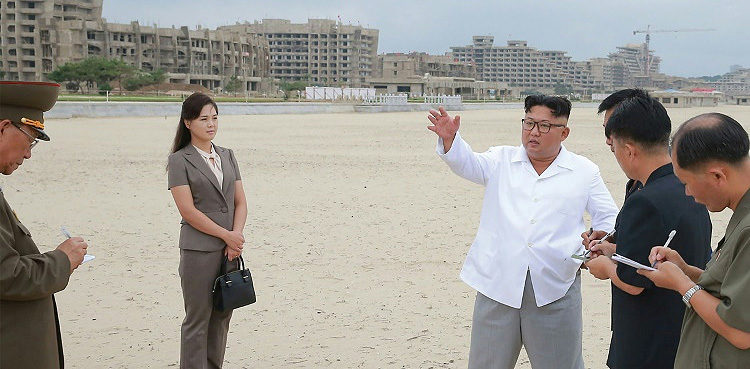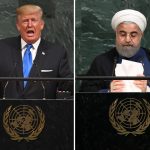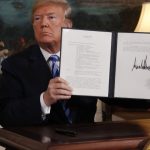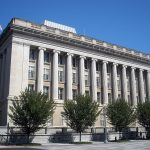by John Feffer
Donald Trump was supposed to break all the rules when it came to North Korea. He agreed to meet North Korean leader Kim Jong Un face to face twice, when none of his predecessors were willing to take such a chance. He suspended U.S. military exercises, held jointly in the region with South Korea, in order to send a signal of compromise to Pyongyang. He spoke of ending the decades of enmity between Washington and Pyongyang.
But when it came time to actually negotiate with his North Korean counterpart, Donald Trump fell back on the same conventional approach of his predecessors. In Hanoi, he offered Kim Jong Un a “grand bargain” – removal of sanctions in exchange for the complete dismantlement of all of North Korea’s weapons of mass destruction.
In other words, Trump repeated the same U.S. demand that North Korea give up everything before it sees anything in return. Worse, at the urging of National Security Advisor John Bolton, a notorious hardliner, Trump expanded the ask from nuclear weapons to all weapons of mass destruction, including biological and chemical armaments.
North Korea has only one major bargaining chip – its nukes. It also doesn’t trust the United States to hold up its end of the bargain. After all, the Trump administration renounced the nuclear deal with Iran even though the latter has scrupulously adhered to the demands of the agreement. As a result, North Korea has insisted on a step-step approach in which it dismantles a component of its nuclear complex in exchange for the removal of certain sanctions.
This was the stand-off in Hanoi: Trump going big and Kim going small. It’s astonishing that the two sides didn’t see this impending train wreck from miles away. Kim must have thought that Trump desperately needed a deal to distract attention from his domestic woes (and bolster his case for winning a Nobel Peace Prize). Trump must have thought that his own negotiating prowess would tilt the balance. They were both wrong.
The negotiations certainly derailed at Hanoi. But the damage is not irreparable.
North Korea is still observing its moratorium on the testing of nuclear weapons and missiles. The United States is holding to its suspension of military exercises in the general vicinity of North Korea. The two Koreas are still negotiating their own patient rapprochement.
There would seem to be a relatively simple solution to the current impasse. As The Washington Post editorialized, “In light of Trump’s failure, the logical course would be to send lower-level negotiators back to the table to work on smaller steps.”
But the Trump administration doesn’t think this way. It is not diplomatic. The president has surrounded himself with all-or-nothing kind of guys like John Bolton and Secretary of State Mike Pompeo. They have never concealed their disgust for any kind of negotiations with North Korea. So, it’s no surprise that they set up Trump to fail in Vietnam.
Trump himself is also no diplomat. He believes that he alone can bring about peace with North Korea. He is like a crime boss negotiating a truce with the head of another criminal syndicate. This is how mafiosos end turf warfare – and it’s exactly how Trump, who as a real estate mogul had lots of dealings with the mafia, approaches international affairs.
As with so many other aspects of Trump administration policy, a fallback position would be for Americans and North Koreans to simply wait for another two years until a more sensible president takes office in Washington.
But even if the Democrats win in 2020, their policy on North Korea would not likely be different. The Democrats have criticized Trump for his overtures to North Korea, and they also subscribe to the same all-or-nothing logic when it comes to negotiations.
So, the prospects are bleak at the moment.
But here’s a third option. South Korea should stop hoping against hope that Trump will overcome the resistance of his advisors and his own delusions of grandeur. South Korea should lobby even harder for exemptions for its economic projects with the North.
This won’t be easy. The United States will still want to see some sign of denuclearization from North Korea.
But one way to solicit support from the Trump administration is to ensure U.S. corporate buy-in to any future economic project. That was the problem with past initiatives. The Kaesong Industrial Complex didn’t include any U.S. companies. The Kumgang Mountain tourism project was exclusively inter-Korean.
Imagine instead an inter-Korean project to develop part of the new tourism complex at Wonsan on North Korea’s east coast that includes a Marriott hotel. Or a couple of McDonald’s restaurants. Or an exclusive purchasing contract with Pepsi.
Or a Trump golf course.
Honestly, in any other country, I’d think that this was a terrible idea. After all, I hate McDonald’s, Pepsi, and Trump golf courses.
But sometimes you have to make unappetizing compromises in the name of peace. So, if we can buy inter-Korean peace at the price of a golf course – and thereby create momentum for U.S.-North Korean détente in the bargain – then I’m all for it.
Reprinted, with permission, from Hankyoreh.






In this good, if depressing, piece of John Feffer, one small nitpick: Bolton in including chemical and biological weapons in ‘denuclearization’ is reflecting that UN Security Council Resolutions on DPRK since 2006 have included: ‘Reaffirming that proliferation of nuclear, chemical and biological weapons, as well as their means of delivery, constitutes a threat to international peace and security’, and ‘Decides also that the DPRK shall abandon all other existing weapons of mass destruction and ballistic missile programme in a complete, verifiable and irreversible manner’. [1718 (2006), 2094 (2013), 2270 (2016), 2321 (2016)]